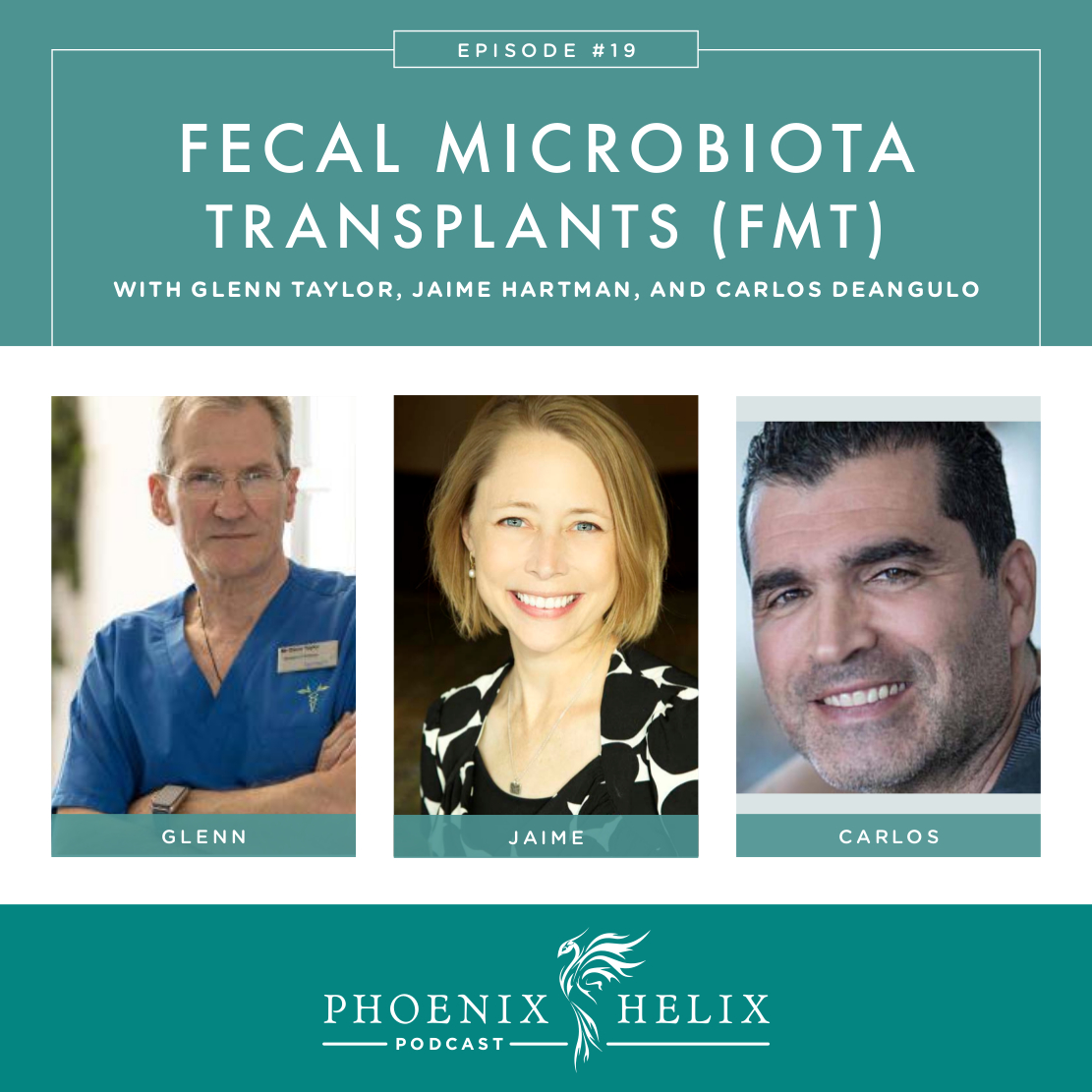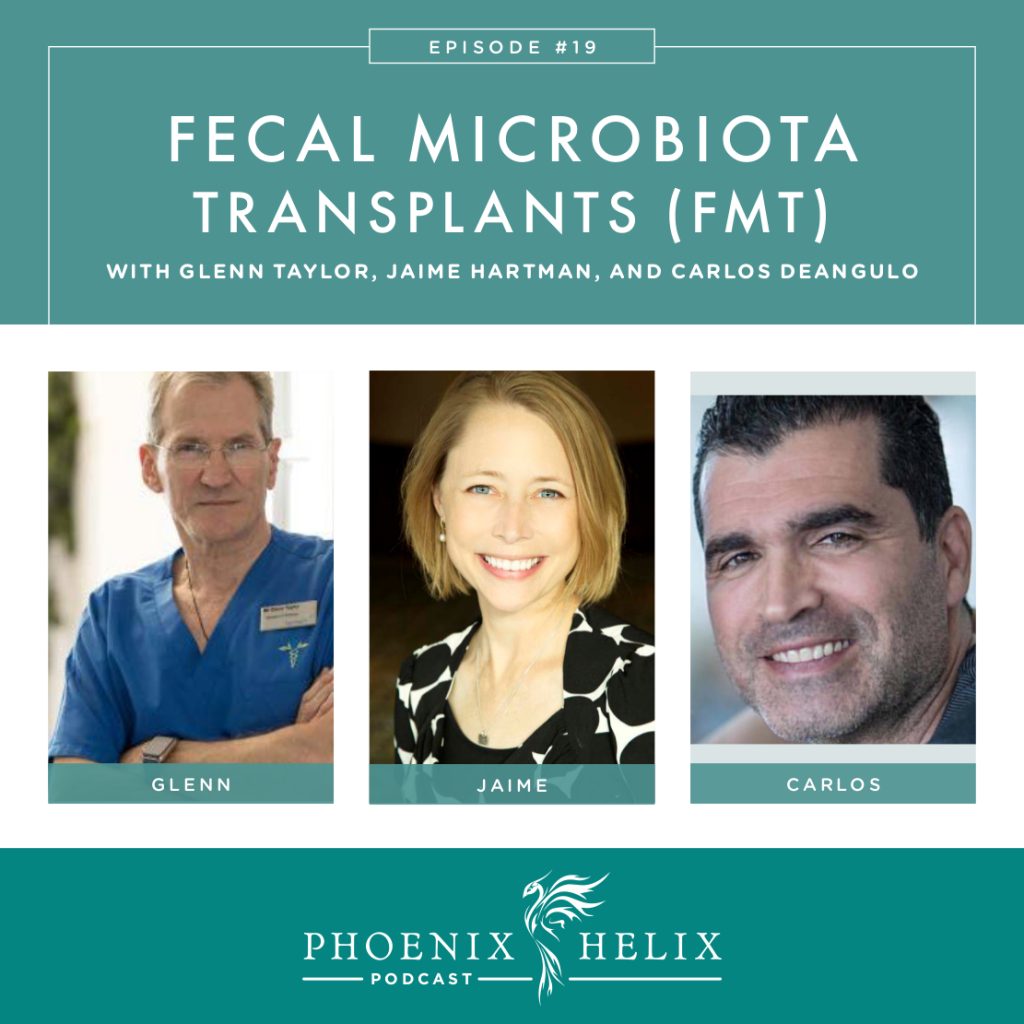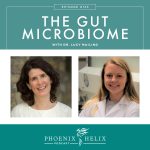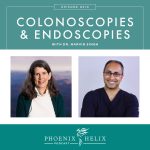The Power of our Microbiome To Heal (or Harm)
This episode of the Phoenix Helix podcast focuses on Fecal Microbiota Transplants (FMT). How does our microbiome affect our health? Is it possible that a “poop transplant” could reverse autoimmune disease? While that sounds a little crazy, if you listen to this episode, it might start to make sense. Right now, FMTs are being used in the United States to cure life-threatening C. difficile infections, where medication has failed. Internationally, clinics are doing research into FMTs in the treatment of autoimmune disease. Today, I’m interviewing a specialist in this field about the science behind these transplants. And then we hear from two patients who have received them: one for C. difficile and one for multiple sclerosis.
Listen to the Show
- Subscribe to my podcast through your favorite podcast app: iTunes, Stitcher, Google, TuneIn, Spotify, Amazon, etc.
- You can also listen to the episode right here through the player below, and if you subscribe to my newsletter you’ll get notified of future episodes.
Podcast: Play in new window | Download
Show Notes
- Intro (0:00)
- Meet Glenn (1:12)
- Glenn Taylor is Director of the Taymount Clinic in the United Kingdom, a world leader in Fecal Microbiota Transplantation (FMT).
- Fecal Microbiota Transplant Laws (1:22)
- In the United States, they are only approved to treat a life-threatening gut infection called C. difficile. In other places in the world (like the Taymount Clinic), FMTs are being used to treat a wide range of health issues, including autoimmune disease.
- The Gut Microbiome (1:50)
- We have 100 times more microbial DNA than human DNA, and there are 10 times as many gut bacteria than human cells.
- There’s a combination of beneficial and pathogenic microbes in our bodies at all times. A healthy microbiome has an abundance of beneficial, which keep the pathogens in check. An unhealthy microbiome has the reverse ratio.
- You can never eradicate pathogens completely, nor do you want to. Some of them have beneficial roles as long as they are kept to small numbers.
- The microbiome changes every day. However, long-term negative trends can lead to health issues which FMTs might help.
- What is a Fecal Microbiota Transplant (FMT)? (7:17)
- Harvesting a complete microbiome from a healthy donor, and transferring it to a patient who is ill, with the goal of restoring their health.
- 5 years ago, there were just four main centers of research: United Kingdom, Minnesota, New York, and Australia. Now, research and clinical treatment is exploding worldwide.
- Screening Donors (11:57)
- Taymount’s practice: Donors are healthy, lean people who eat a paleo-style diet and go through comprehensive blood and stool testing to confirm their health. The stool samples are frozen and re-tested over an extended period of time to ensure no dormant illnesses manifest. They give their patients transplants from multiple donors, for a more complete microbiome.
- Not all clinics follow such stringent screening procedures. If you are a prospective patient, ask about donor screening details.
- Why Taymount Clinic Recommends the Paleo Diet (16:49)
- Our digestive system is designed to eat real food.
- C. Difficile Infections (18:11)
- C. difficile caused almost half a million infections and 29,000 deaths in the United States in 2011. (CDC Statistic)
- It is often anti-biotic resistant. In fact, this infection usually occurs after a round of antibiotics. Once their numbers are abundant, they can kill beneficial bacteria, allowing their numbers to grow even further. Sometimes antibiotics simply make it go dormant temporarily, which is why recurring infections are common.
- It’s a very common bacteria in the environment, but doesn’t colonize a healthy gut. Another bacteria in the same family that’s beneficial (C. scindens), works to prevent C. difficile from taking root. Antibiotics kill C. scindens, which is why this infection often happens after a round of antibiotics.
- FMTs restore a healthy microbiome, including C. scindens. The cure rate is currently 83-100%.
- FMTs for Autoimmune Disease (23:48)
- 70% of our immune system is in our gut. The microbiome is incredibly dynamic. For every human generation (25 years), we can have up to 660,000 bacterial generations. Placing our immune system in our gut makes it able to learn, adapt and protect. Our microbiome is our interface with the environment.
- Everyone with autoimmune disease has gut dysbiosis. When that is corrected, many symptoms disappear as the overactive immune response calms down under the direction of a healthier microbiome. It’s not a cure, but it “clears the static” and makes troubleshooting from there much more effective.
- Do-It-Yourself Transplants (32:20)
- Since it’s illegal to receive a transplant in the US for any condition other than C. difficile infections, many people are trying to do them at home.
- Glenn warns against this. You can make your condition worse and/or introduce other health issues. Contamination is a high risk. Also, many species of microbes die in the presence of oxygen, and therefore home treatments don’t have the same diversity as transplants done by clinics with anaerobic lab equipment.
- If you do decide to try this anyway, take steps to make it as safe as possible. Test your donor’s health and stool thoroughly over a length of time. Resources: (1) Testing (2) DIY Checklist.
- Jaime’s FMT Experience for C. Difficile (38:59)
- Jaime Hartman is the blogger behind Gutsy By Nature. She has Crohn’s disease and received a fecal microbiota transplant last year for a recurring C. difficile infection. Her husband was the donor, and her gastroenterologist in the US performed the transplant. She shares the details of the procedure, as well as her results.
- Carlos’ FMT Experience for Multiple Sclerosis (53:41)
- Carlos DeAngulo has multiple sclerosis and traveled to the Taymount Clinic in the UK to receive his FMT. He was referred by his doctor, David Perlmutter, author of The Grain Brain. Carlos shares the details of his experience, as well as his results.
- Resources (1:07:33)
- Taymount Clinic in the UK.
- Powerofpoop.com – The ultimate resource for FMT information.
- FMT Pills: Bright Medicine Clinic and the New York Times article.
- Clinical Trials for Crohns (Canada and Boston) and Ulcerative Colitis (Chicago and Vermont) and either Crohns or UC (San Francisco).
- Outro (1:09:59)
- Eileen (your podcast host) is the author of multiple books, written to help people thrive with autoimmune disease. Learn more on the Books Page.
- If you like this podcast, follow or subscribe through your favorite podcast app. You can also subscribe to Eileen’s biweekly newsletter.
- Check out the entire archive of podcast episodes.
You May Also Be Interested In
Spreading the Word
If you like the podcast, please leave a positive review in iTunes. It would mean the world to me, and also helps others find the podcast. Here are some quick instructions using your iPhone:
- If you are already subscribed to my podcast: (1) Click the purple podcast icon. (2) At the bottom of the screen, click Library. (3) At the top of the screen, click Shows. (4) Click the Phoenix Helix podcast image. (5) Scroll down the page, and you’ll see Ratings and Reviews. Scroll down a little bit more and click on Write a Review. This will bring up the review screen. Tap 5 stars (if you love the podcast), and then click in the title box, and it will bring up the keyboard. Enter a title and short review. (6) Click Send in the upper right corner. (7) Thank you! Positive reviews give the podcast a higher search ranking in iTunes, helping people find it and letting them know it’s a quality podcast and worth their time to listen.
- If you haven’t subscribed to my podcast: (1) Click the purple podcast icon. (2) In the lower right corner, click the magnifying class. (3) Type Phoenix Helix in the search box. (4) Click the podcast cover in the Show list. (5) If you’d like to subscribe, click the + sign at the top of the screen. (6) To write a review, scroll down the page, and you’ll see Ratings and Reviews. Scroll down a little bit more and click on Write a Review. This will bring up the review screen. Tap 5 stars (if you love the podcast), and then click in the title box, and it will bring up the keyboard. Enter a title and short review. (7) Click Send in the upper right corner. (8) Thank you! Positive reviews give the podcast a higher search ranking in iTunes, helping people find it and letting them know it’s a quality podcast and worth their time to listen.










Please consider doing a podcast on bacteriophages – how they are located, isolated, which specific phages work for specific ailments etc., their relationship within the microbiome, any cutting edge developments to date. Where is the science now etc.
Hi Barbara. I will add that to my list of potential topics. I have hundreds of ideas and limited episodes, so not every idea gets chosen. Bacteriophages might be a little too scientific for my podcast. But if you know an expert that could break it down into layman’s terms, please share.
Eileen – another fascinating podcast. Thank you. I found Glenn’s views on public safety and screening particularly interesting. This is my biggest concern with the procedure – the health of the donor! Clearly, the Taymount Clinic has it’s own rigorous testing procedure. It will be interesting to see where this science takes us…
Agreed, Joanna. I would be incredibly picky about a donor, and I can see why it takes so long to find one that meets Taymount standards. I was thinking of my own friends and family, and I don’t think there’s anyone I would consider healthy enough to be a donor. Which tells you something about the state of health in the world today!
Dear Eileen,
This podcast delivered an amazing dose of hope at the right time for me. Like so many others with autoimmune disease, my journey to heal my gut and reverse my autoimmune problems has been a seesaw of improvements and then diminished returns. Not to get my hopes up too high, but listening yesterday to your thorough, wonderfully curated hour on FMT, I feel newly encouraged that maybe I really can get my life back after all. I am researching all the options from your show notes to begin to develop a serious plan of action.
Up from the ashes once again: I thank you for your work and in particular this life changing episode.
Warmly,
Cindy
I’m so glad, Cindy. We are all seeking those “missing pieces” to our healing puzzle. May this be one of yours.